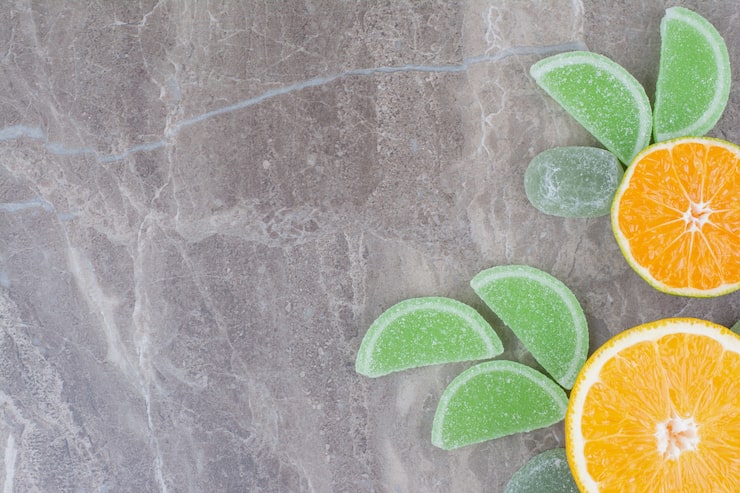Citric acid shows up everywhere — from the bright bite of orange juice to the fizz in your favourite soda. It occurs naturally in citrus fruits like lemons and limes, and the food industry also uses it as a preservative and flavour booster.
But is citric acid bad for your teeth? Yes, it can be. It wears away enamel, the hard outer layer that protects teeth. Over time this can cause sensitivity, stains, and more cavities.

This article looks at how citric acid affects dental health and gives simple, practical tips to enjoy citrus flavours without damaging your smile.
The effects of citric acid on teeth
Here’s how citric acid can affect your dental health.
Enamel erosion and tooth sensitivity
Citric acid is a common cause of enamel erosion. When you bite into a lemon or sip a soft drink, the acid softens the enamel. This makes it easier for chewing or brushing to wear the enamel away.
As enamel thins, the layer beneath becomes exposed. That layer has tiny tubes that lead to the nerve, so exposed areas react strongly to hot, cold, sweet, or sour foods — causing sharp sensitivity.
Tooth decay
Repeated acid exposure doesn’t just thin enamel — it also makes teeth more prone to cavities. Weakened enamel lets bacteria settle in more easily, and an acidic mouth environment helps those bacteria thrive, especially if oral hygiene slips.
Staining and other visual changes
Citric acid itself doesn’t stain teeth, but by thinning enamel it lets the darker, yellowish dentin show through. Worn enamel also makes teeth more likely to pick up stains from coffee, tea, or tobacco.
Impact on dental work
Citric acid can affect fillings, crowns, and implants. Small amounts can be helpful in dental treatments, sometimes improving materials or reducing bacteria. For titanium implants, low levels may help resist corrosion and be more compatible with the body. But high or prolonged exposure could weaken dental materials or increase corrosion if protective layers are worn down.
When is citric acid too much for your teeth?
Most people don’t think about how often they expose their teeth to acid. It’s not just how much you consume but how often and how you consume it. Sipping lemonade over hours does more damage than drinking it quickly, because the longer your teeth are bathed in acid, the more erosion occurs.
To protect your teeth, limit acidic drinks to meal times and rinse your mouth with water afterward.
How citric acid affects your gums
Citric acid can irritate gums, especially if they’re already sensitive or inflamed. Ongoing exposure may worsen gum problems like gingivitis. If your gums feel sore after acidic foods or drinks, it’s a sign to cut back.
Tips to reduce citric acid’s impact on your teeth
Simple steps can help protect your smile.
How to neutralize citric acid
– Rinse with water after acidic snacks or drinks to wash away and dilute the acid.
– Eat dairy like milk or cheese after acidic foods — they help neutralize acid and add calcium.
– Chew sugar-free gum to boost saliva, which naturally balances mouth acid and helps protect teeth.
Diet changes to lower acid exposure
– Cut back on citrus fruits, sodas, and other acidic foods and drinks.
– Have acidic foods with meals rather than as standalone snacks so acid exposure is shorter.
– Follow acidic foods with alkaline choices like nuts or dairy to help rebalance your mouth’s pH.
Wait before brushing
Don’t brush for at least 30 minutes after eating or drinking acidic foods. Acid softens enamel, and brushing too soon can remove more of it. Waiting lets saliva neutralize acid and rebuild enamel minerals before you brush.
Citric acid in dental products — is it safe?
Citric acid in mouthwash and toothpaste
Citric acid appears in some mouthwashes and toothpastes. At the low levels used in these products, it’s generally safe. Safety also depends on how the product is made to keep pH balanced while still fighting bacteria. Use dental products as directed, avoid overuse, and choose brands and products approved by dental associations.
Citric acid in teeth whitening
Citric acid can help break down stains, which is why it sometimes appears in whitening products. But because it’s acidic, overuse or strong concentrations can harm enamel. Whitening products that contain citric acid should be used carefully and preferably under a dentist’s advice. Some research suggests a 5% concentration can be safe under certain conditions, but professional guidance is the best way to avoid enamel damage while whitening.
Final thoughts
Knowing how citric acid affects your teeth helps you enjoy citrus flavours without harming your smile. Balance is key: enjoy acidic foods in moderation, follow protective habits, and ask your dentist for advice tailored to your needs.